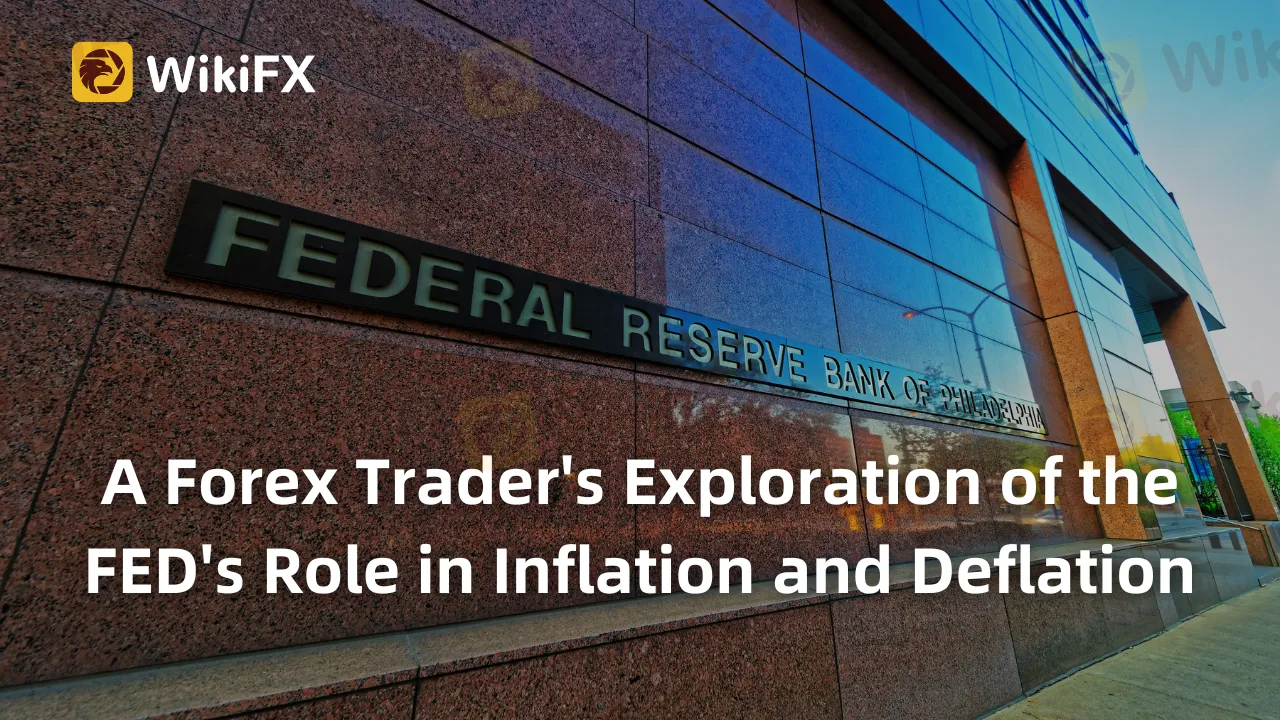Abstract:The Federal Reserve's monetary policies, aimed at managing inflation and deflation, significantly affect the value of the US dollar in Forex markets. Forex traders who understand these policies can predict currency trends and make informed trading decisions, potentially gaining a strategic advantage in the market.

The
Federal Reserve (Fed) has a significant influence in determining the economic landscape of the United States. Understanding the Fed's involvement in inflation and deflation as a Forex trader may dramatically improve your trading technique. This article examines the Fed's role in regulating inflation and deflation, as well as how this information might give a strategic advantage to Forex traders.
What Is the Federal Reserve's (FED) Role in Managing Inflation and Deflation?
The primary mission of the Federal Reserve is to provide economic stability in the United States. This entails managing both inflation and deflation. The Fed wants to keep inflation at about 2% per year, which is widely seen to encourage a healthy economy.
In periods of inflation, when prices rise and the value of money falls, the Fed undertakes contractionary monetary measures. These measures include hiking the federal funds rate, which raises borrowing costs and reduces economic activity, lowering inflation.

During deflationary times, when prices fall and the value of money rises, the Fed implements expansionary monetary policies. These include decreasing the federal funds rate to make borrowing more affordable, so increasing economic activity, and combating deflation.
How Can Forex Traders Benefit from Knowing the Fed's Inflationary or Deflationary Policies?
The Fed's monetary policies have a considerable impact on the value of the US dollar, which affects Forex trading. Traders may utilize this information to make smart trading choices.
When the Fed employs contractionary policies to combat inflation, interest rates often rise, making the US currency more appealing to international investors. Because of this increased demand, the dollar's value may climb versus foreign currencies. Conversely, when the Fed pursues expansionary measures to fight deflation, the accompanying lower interest rates might reduce the attraction of the US dollar to overseas investors, thus causing its value to decline versus other currencies.

Traders who understand these dynamics may utilize this knowledge to forecast currency swings and make more educated trading choices.
How Do Inflation and Deflation Affect the Value of the US Dollar in the Forex Market?
Inflation and deflation have direct effects on the value of the US dollar in the Forex market. Inflation reduces the buying power of money, leading the value of the dollar to fall. Deflation, on the other hand, raises the buying power of money, raising the value of the dollar.
These variations in the value of the dollar might provide possibilities for Forex traders. For example, a trader anticipating inflation could sell US dollars in expectation of their depreciation. In contrast, a trader anticipating deflation may purchase US dollars in expectation of their rising value.
How Can Understand the FED's Role in Inflation and Deflation Aid in Predicting Forex Market Trends?
The Fed's monetary policies and their effects on inflation and deflation may give significant insights into possible Forex market movements. Forex traders may generate better-educated forecasts regarding future currency value swings by constantly tracking the Fed's operations and comprehending their possible effects on the US economy.

For example, if the Fed indicates that it intends to increase interest rates to fight inflation, Forex traders may expect a strengthening of the US dollar and change their trading methods accordingly.
Can the FED's Inflation and Deflation Policies Provide a Strategic Advantage in Forex Trading?
Yes, the Fed's policy on inflation and deflation may give a strategic advantage in Forex trading. Forex traders can forecast the value of the US dollar by knowing the Fed's monetary policy.
For example, if the Fed implements an expansionary strategy to promote the economy, it often results in lower interest rates. As a result, the value of the US dollar versus foreign currencies may fall. Contractionary measures aimed to fight inflation, on the other hand, might boost interest rates, possibly raising the value of the US dollar.
As a result, Forex traders who keep updated about the Fed's actions and understand their ramifications might utilize this information to their advantage. This might include purchasing or selling US dollars or other currencies in reaction to expected changes in monetary policy.

In conclusion, knowing the Fed's role in regulating inflation and deflation is critical for every Forex trader. By remaining educated on the Fed's policies and understanding their possible effects on the US dollar, traders may make better-informed choices and perhaps gain a strategic advantage in the Forex market. However, like with any kind of trading, success demands not just knowledge but also rigorous analysis, strategic planning, and risk management.
Download and install the WikiFX App on your smartphone to stay updated on the latest news.
Download the App here: https://social1.onelink.me/QgET/px2b7i8n














